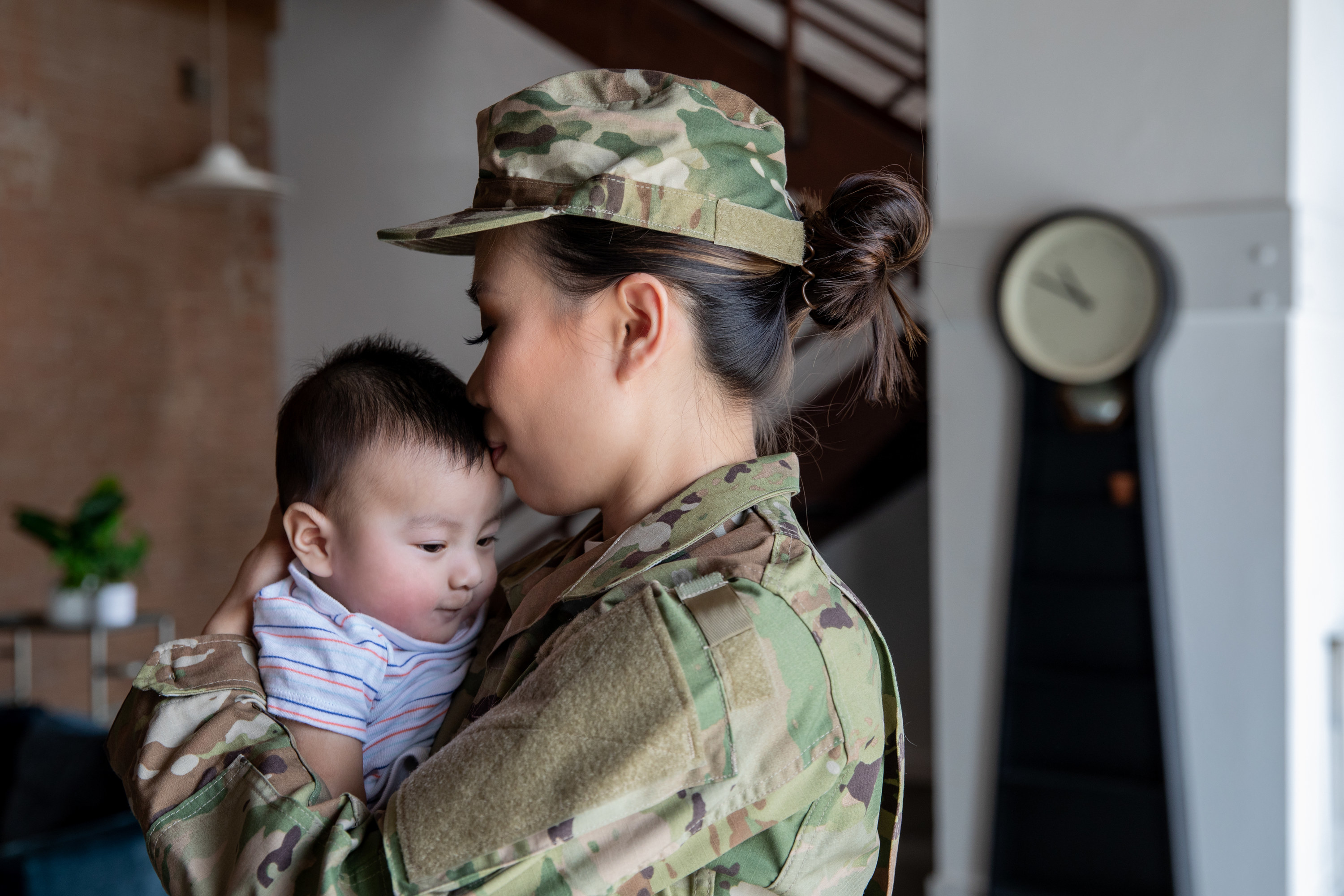Moving somewhere you’ve planned has a sense of control; moving somewhere you never wanted to live because someone told you to is scary. Sure, there is some element of choice in many instances — for example, our family gets a “dream sheet” where we can list our preferred stations or locations — but there’s no guarantee and sometimes no notice. There are also stories of families getting denied preferred locations thanks to a family member receiving mental health services or medical concerns. It’s pretty scary knowing that doing the right thing and seeking support for your mental health can negatively impact your spouse’s career and your family’s plans. Yes, you get the hang of it, but a recent survey put moving as more stressful than a divorce or having children, with 45% responding that it was the most stressful event in their lives. Now imagine doing that every one to four years. On our last house hunting process, we found our place over Zoom. We worked with a realtor, had no knowledge of the area, and just jumped in — hoping we would eventually like the neighborhood. Why not military housing, you ask? Not every station has it. Many people have the idea that military members have free housing, and that’s just not the case. Not every station has housing, the BAH (Basic Allowance for Housing) doesn’t often cover the average rent in the area, and when you DO get to a station with housing, it’s first come, first served — and you have very little say in the matter. Housing is extremely stressful — and a BAH too low to cover rent or a mortgage means you’re forking out money out of a very low income to cover the rest. Stations are also dropping Cost of Living Allowance (COLA) at an alarming rate. Why does that matter? Check out the base pay of enlisted personnel. For someone who wants to see the country or world, it’s awesome. For a homebody who wants to be near extended family, the moving can be rough. “Looks like I’m heading in for disaster relief. I’m running home to grab a few things, and I don’t know when I’ll be back.” “OK.” “Hey. I know we were penciled in for Hawaii, but now we’re heading to Alaska.” “Wait, what?! OK.” As a military spouse, you just learn to shrug and carry on, because there’s literally nothing you can do about it. Military spouses have to be adaptable, able to be on their own, and strong. As a result of changing schedules and sudden deployments, military spouses tend to be on their own a lot. All that to say? If you know a military spouse, check in on them. But that doesn’t change the fact that military spouses are the most underemployed group in the nation, with a whopping 63% of us underemployed. According to the National Commission of State Legislatures, “Military spouses faced a 22% unemployment rate and a 26% wage gap compared to their civilian counterparts before COVID-19." Military spouses face an unemployment rate roughly five times more than the national rate. Many cite childcare as one of the biggest issues, and it’s tough out there – especially for families with young children. There are subsidies available for those who work full time, but those who work part time don’t qualify, so we have to spend our already depressed wages for the opportunity to work. Last year, for example, a full third of my income went to an eight-hour per week babysitter – and she was a steal for our area. Why does the burden of childcare often fall on the spouse? Military members often have unpredictable work hours and rotating shifts that include days, nights, weekends, and 24-hour shifts. Many spouses don’t have consistency for childcare or regular work hours we can commit to. Further, anyone with a keen eye can spot a military spouse on a resume, which becomes a liability for many companies. Since it’s extremely hard to get a job you’re qualified for, so many will take any job just to get by — some leaving advanced degrees, law practices, and teaching careers behind. These types of jobs can also come with certain levels of PTSD from service members, as evidenced by all-time highs of suicide rates in service members and veterans. Whether or not your spouse has diagnosed PTSD, they often see some very grizzly things, and that has an effect on them. Given the continued lack of adequate mental health support service-wide, being a military spouse can sometimes have an additional job of working with your partner’s mental health issues. Luckily, though, many branches of the military offer mental health resources for spouses. Military OneSource and some of the DOD and DHS services have links to covered mental health services, which is an amazing benefit. Making friends in the service can also be a challenge because there are an entire group of people who have no support systems. Trying to get together when there are no babysitters and not enough income to hire one is challenging. All of that combined with how hard it is to make friends after high school makes it one of the hardest parts of being a military spouse. When you do find someone, though, the friendships are so special. It’s awesome when you find someone who understands your life and is in a similar spot. There are various spouse social organizations and clubs, and while it takes effort, just jumping in can be so helpful. When you are all together and all away from family, each station has a special feel of chosen family, even if it’s difficult to get together. We all look out for one another, and I love those relationships. Military kids have to remake friends and adapt to new school rules, regional differences, expectations, and work their way up again in extracurricular activities in ways that many kids just don’t have to. I try to let my kids’ teachers know that they may need some help making friends as the “new kids,” but it’s really easy to thank a service member for their service while not knowing how to support their kids. Military kids need a lot of support from the community and schools. They, too, are living in uncertainty of their parent’s job, the difficulty of being asked to move again, the fear of picking up right after getting settled, all while dealing with just being a kid in general. It’s tough to always feel like the new kid. Some adapt well, but others don’t. As a spouse, this can be a really difficult thing. It’s amazing to see your kids rise to the occasion, but I do wish there were more supports in place for them, especially in locations where there isn’t a strong military presence (not every station is a huge base). The plus side? Every station I’ve been to throws amazing parties for the kids, and it is, hands down, what I will miss most when my husband retires. (On a significantly more shallow note, it’s also cool going to an air show and going home with the one in the uniform.) One amazing example was in 2019 when the government shut down and the only service to not receive payment was the Coast Guard. Many military families live paycheck to paycheck and found themselves without pay for multiple pay cycles. The spouse community rallied and created food pantries at many stations and collected community food donations and grocery gift cards. Although using Coast Guard families as leverage for a shutdown was horrible, the camaraderie and support from the community were impressive to witness. I also do not regret the strength I’ve developed over the past few years, as well as the independence. While I may be ready for some stability in my own life, the experiences have been incredible, and I know very few spouses who are completely miserable. There’s a built-in optimism from years of needing it that’s a helpful skill all around. The military was an awesome career choice for my husband, and I’ve been glad to support him through it. And I know some may have questions: Why would I jump into the lifestyle in the first place? Because there’s no way to prepare anyone for it unless you grew up in it. Why do I continue fight through it today? Because I promised my husband I would. He works his tail off on a mission we both truly believe in. Lives have been saved because he was there to save them. He’s a man who tries his best at home and at work — and I choose to support him because he’s worth that support and sacrifice on my end. On hard days where it seems too hard to be worth it — because no relationship is perfect — I remember that we are temporarily putting our comfort on hold because we truly believe that the people my husband serves are worth it. When you focus controlling what you can, you can create a life that is fulfilling, wonderful, and secure in spite of difficult circumstances. Being a military spouse is the biggest role I have in my life, but I focus most on being a wife, mom, and teacher and creating a secure household for my family. Also: therapy. Therapy is the best. 🙃






